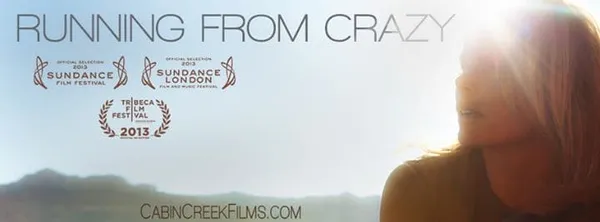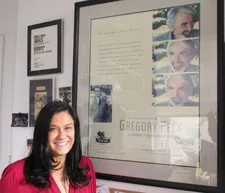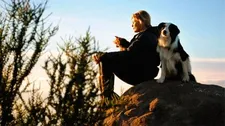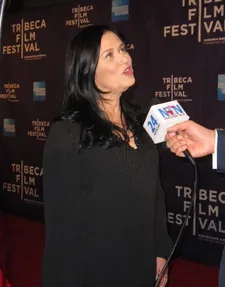 |
| Barbara Kopple's Running From Crazy |
Running From Crazy, Barbara Kopple's intimate and revealing portrait of the Hemingway women - Ernest's granddaughters and great-granddaughters, and the men in their lives - is a documentary on American royalty. The uniqueness of the film consists in the combination of frank interviews with Mariel Hemingway, who has been running from the crazy stigma all her life, and never before seen footage presented by her sister Margaux, who committed suicide in 1996.
When I arrived at Kopple's office in New York City to discuss her film, the news had just broken about shootings at LAX airport. Barbara left a message for Mariel inquiring if everything was okay at her end and we spoke about Julian Schnabel's dream. The name Hemingway, like Kennedy, triggers immediate emotions. Running From Crazy is less interested in the myth than the traumas, fears and internal demons that haunt the clan.
 |
| Barbara Kopple: Mariel "never knew that Margaux had ever done this filming." Photo: Anne-Katrin Titze |
Barbara Kopple: Human life for me is just so valuable. When you hear those things it just turns you upside down. You think about the family and the people. Who is this person who would take all those lives? We just heard about it when you came in. You know, a lot of people are in from LA because our film is showing tonight.
Anne-Katrin Titze: Mariel Hemingway gave you an immense amount of trust. Although you are not visible on camera or audible, your spirit is tangible.
BK: Lurking, yeah.
AKT: Mariel is talking to you, confiding in you. Were you present when the car broke down or climbing the rocks?
BK: Everywhere.
AKT: Did you know her before?
BK: I didn't know her before. A friend of hers, Lisa Erspamer, who worked at OWN [Oprah Winfrey Network] had said to her 'we should do a film about your life and your family.' And Mariel said 'absolutely not.' Then she called me and she said 'would you like to do a film on Mariel Hemingway?' And I said 'yes'. So she called her back and she might have heard of me… So we got together and talked for a really long time and adored each other and said we'll do it. The wonderful thing for me was looking into this family and trying to see who they really are as people. And for her it was time to go deep and tell everything. So the timing couldn't have been more perfect.
AKT: You have moments in your film when during an aside, a small comment, a huge revelation about the Hemingway family opens up into an abyss. Of course I am thinking about the topic of incest. But also the food issues, the alcohol. Things that in most families…
BK: …are never talked about.
With the news about the LAX shooting and the concern about what is happening there, our conversation drifts to an obvious topic for most New Yorkers, 9/11. I had been only a few blocks away from Barbara's Soho office that day. She had been in the Hamptons.
 |
| Mariel Hemingway on the rocks with her dogs in Ketchum, Idaho. |
BK: It was really weird, I was doing a film on the Hamptons in 2001 [The Hamptons, a TV mini-series documentary] and I had been living there during the filming from May to September. Two days before it happened I had been talking to Julian Schnabel, who is a great painter and filmmaker. His new work was sort of crazy and all over the place. So I said to him "Do you have a lot of dreams about your work and about things?" And he said: "I've been having a repetitive dream about an airplane hitting a building." And then two days later that happened. It's in the film.
We get back to Running From Crazy.
AKT: There is a very telling scene in which Stephen Crisman, Mariel's ex-husband [and father of her two daughters] visits her. Did you arrange the meeting for the camera?
BK: He is so wonderful. I called him. He was very reluctant but she was all for it. Then she called him and said 'you'd be doing a personal favor to me if you allowed this to happen. He is a documentary filmmaker also. He worked for National Geographic. He had a big restaurant in New York when he was married to her called Sam's [Cafe]. And he is very brilliant and smart and nice… I also see that he is still in love with her.
AKT: What about her?
BK: No. She likes Bobby [Williams].
AKT: The ex-husband sums up what he thinks is wrong with Mariel. He says: "You didn't want to give your power away. You gave it away continuously to other people."
BK: Yes. That's very reflective and very insightful. He was the one who collected all the Hemingway books to make sure that she had them. He gives you insight into the father and the collateral damage that's done to Jack because of his upbringing.
AKT: Mariel's two sisters, Margaux [née Margot] and Muffet [née Joan] are equally important.
BK: Yeah, a tale of three sisters.
 |
| Barbara Kopple on the Tribeca Film Festival red carpet: "The sisters have their own power." Photo: Anne-Katrin Titze |
AKT: The footage you show of the film Margaux made about her grandfather and family, how did you get to include this? Who made this film?
BK: It's called Winner Take Nothing. I think they put an hour together on VHS. My friend Alan Barker, who was also our sound recordist, when we went to Ketchum, he said to me: 'When I first started, I did camera and I did some stuff for Margaux on film she was doing tracing her grandfather's footsteps.' … We tracked down the footage - some of it had burned in someone's barn. We found the place that was holding a lot of the footage and they said, we're going to have to blow the dust off it because nobody had ever seen it. It has been sitting on the shelves for years. I said, we want to see it all. They said, it'll cost a lot of money. I said, I don't care. Every week we would get little packages with this footage. We would all sit around glued to watch it.
AKT: And did Mariel watch it?
BK: No. She never knew that Margaux had ever done this filming. And I never told her that I got it until we were in the fine cut of the film and I was showing her the film for the first time. At the beginning she thought it was all about her and she got very emotional. And all of a sudden she saw all this film that she never knew existed of her parents and Margaux, of Muffet and of the house they lived in. The rooms and the kitchen, her mother with the feet on the sink.
AKT: At wine time.
BK: Wine time and everything. I didn't want to encumber her memory. I wanted her to be free to talk about the things that she remembered. It was wonderful for her because she wasn't sure if they were only her memories or real.
AKT: You never felt you were betraying her by not showing her the footage of her family earlier?
BK: No. Not for a moment. Because if she knows that there is all of that stuff, she is going to be scared to speak. I wanted her to bloom to be free who she is.
AKT: Mariel's daughters Dree and Langley, how did they respond?
BK: Langley saw the film for the first time at the Sundance Film Festival where it premiered and she loved it. She said 'this is the first time I've ever seen my grandparents, other than photos.' The first time seeing the house and what life was like. Who Margaux is and who Muffet is. She felt it was really important.
AKT: You start the movie with the Town & Country photo shoot of Langley with her mother. And Dree?
BK: Dree? I don't know. I think she's glad that it's there because Margaux was an idol of hers and people she worked with would say wonderful things about Margaux. To be able to see Margaux was something very special for her, but she was less forthcoming than Langley was.
AKT: You made some interesting choices how you show Muffet. When Mariel visits her, the camera at first remains across the street, as though you give the space.
BK: Well actually she came out [Muffet] and we hugged and kissed and got introduced. She is so warm and wonderful. I just wanted it to be 'the visit' and not feel the camera there.
AKT: Can you talk about your decision not to go into any medical explanations at all?
BK: That's not what the film was about. It was really about these three sisters. Yes, it's about mental illness and suicide. But I wanted you to feel who they were and just make your own decisions. I didn't want to have experts talk about suicide, that's not the kind of film that I make.
AKT: It is fascinating how Margaux's footage blends with yours. You forget that they are both dead, when the father ties a fly for fly-fishing and tells his daughter: "brassy wing and black heart - just like you."
BK: Before that he says 'my mother and I are not worried about you.' And she gets sad, because she wants them to worry about her. Before that you saw Mariel saying 'I wanted them to tell me not to go to New York. We want you here.' All of them just wanted to be loved.
AKT: At the end of the film, we see Mariel talk to her own daughter about her care and concern. Where did you film that?
BK: It was where the ferries come in on the westside, by the water. That was the march of the people from the American Foundation for Suicide Prevention. The march for the people who had died.
AKT: Mariel says that life shouldn't be about perfection but about imperfection.
BK: And it's true. We can't design our world and we can't design who we are as people.
 |
| Town and Country shoot with Mariel Hemingway and her daughter Langley. |
Running From Crazy opens this weekend in New York and in Los Angeles on November 8.
You can read what Mariel Hemingway had to say about the film here.





















